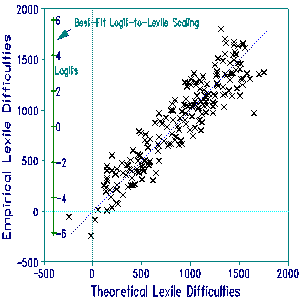
The Lexile theory of readability measurement is attempting for reading comprehension what Newtonian mechanics achieved for astronomy. Initially, the Ptolemaic system of eccentric circles and epicycles described the motions of the planets more precisely than Newtonian mechanics. Newtonian mechanics, however, embodied a strong predictive theory which identified discrepancies for investigation and explanation. Explanations included telescope misalignment, the influence of unobserved planets (Uranus, Neptune), and short-comings in Newtonian theory (orbit of Mercury, since explained by Einsteinian relativity). The Ptolemaic system of making the model fit the data would have discovered none of these. Once established, however, Newtonian mechanics went far beyond astronomy, transforming physics and enabling our modern world.
Lexiles simplify the complex, content-ridden process of reading comprehension into two abstract, content-free components: syntactic load (quantified by sentence length) and semantic demand (quantified by word frequency). Even though reading experts insist that lexiles are a hopeless over-simplification, empirical work with Lexiles demonstrates that lexile theory-based item calibrations produce reading comprehension measures as accurate as any observational data-based calibration.

The Figure shows the relationship between lexile-theory and data-based calibrations for 200 sentence completion test items. The data-calibrations are in logits, rescaled to follow an identity line. In this relationship (which gives equal weight to theoretical and empirical values), the standard deviation of empirical values around the theoretical values is 177 lexiles (about 1 logit). Though departures from the identity line invite investigation, their impact on practical measurement with tests of reasonable length is negligible (see Wright & Panchapakesan, 1969).
Because of findings like this, several U.S. States are using lexiles as a fair and practical method for equating nationally published and locally produced reading comprehension tests.
Wright B.D. & Panchapakesan N. 1969. A procedure for sample-free item analysis. Educational and Psychological Measurement, 29, 23-48.
Theoretical prediction of test items. Burdick B, Stenner AJ. … Rasch Measurement Transactions, 1996, 10:1 p.475
| Rasch Publications | ||||
|---|---|---|---|---|
| Rasch Measurement Transactions (free, online) | Rasch Measurement research papers (free, online) | Probabilistic Models for Some Intelligence and Attainment Tests, Georg Rasch | Applying the Rasch Model 3rd. Ed., Bond & Fox | Best Test Design, Wright & Stone |
| Rating Scale Analysis, Wright & Masters | Introduction to Rasch Measurement, E. Smith & R. Smith | Introduction to Many-Facet Rasch Measurement, Thomas Eckes | Invariant Measurement: Using Rasch Models in the Social, Behavioral, and Health Sciences, George Engelhard, Jr. | Statistical Analyses for Language Testers, Rita Green |
| Rasch Models: Foundations, Recent Developments, and Applications, Fischer & Molenaar | Journal of Applied Measurement | Rasch models for measurement, David Andrich | Constructing Measures, Mark Wilson | Rasch Analysis in the Human Sciences, Boone, Stave, Yale |
| in Spanish: | Análisis de Rasch para todos, Agustín Tristán | Mediciones, Posicionamientos y Diagnósticos Competitivos, Juan Ramón Oreja Rodríguez | ||
| Forum | Rasch Measurement Forum to discuss any Rasch-related topic |
Go to Top of Page
Go to index of all Rasch Measurement Transactions
AERA members: Join the Rasch Measurement SIG and receive the printed version of RMT
Some back issues of RMT are available as bound volumes
Subscribe to Journal of Applied Measurement
Go to Institute for Objective Measurement Home Page. The Rasch Measurement SIG (AERA) thanks the Institute for Objective Measurement for inviting the publication of Rasch Measurement Transactions on the Institute's website, www.rasch.org.
| Coming Rasch-related Events | |
|---|---|
| May 17 - June 21, 2024, Fri.-Fri. | On-line workshop: Rasch Measurement - Core Topics (E. Smith, Winsteps), www.statistics.com |
| June 12 - 14, 2024, Wed.-Fri. | 1st Scandinavian Applied Measurement Conference, Kristianstad University, Kristianstad, Sweden http://www.hkr.se/samc2024 |
| June 21 - July 19, 2024, Fri.-Fri. | On-line workshop: Rasch Measurement - Further Topics (E. Smith, Winsteps), www.statistics.com |
| Aug. 5 - Aug. 6, 2024, Fri.-Fri. | 2024 Inaugural Conference of the Society for the Study of Measurement (Berkeley, CA), Call for Proposals |
| Aug. 9 - Sept. 6, 2024, Fri.-Fri. | On-line workshop: Many-Facet Rasch Measurement (E. Smith, Facets), www.statistics.com |
| Oct. 4 - Nov. 8, 2024, Fri.-Fri. | On-line workshop: Rasch Measurement - Core Topics (E. Smith, Winsteps), www.statistics.com |
| Jan. 17 - Feb. 21, 2025, Fri.-Fri. | On-line workshop: Rasch Measurement - Core Topics (E. Smith, Winsteps), www.statistics.com |
| May 16 - June 20, 2025, Fri.-Fri. | On-line workshop: Rasch Measurement - Core Topics (E. Smith, Winsteps), www.statistics.com |
| June 20 - July 18, 2025, Fri.-Fri. | On-line workshop: Rasch Measurement - Further Topics (E. Smith, Facets), www.statistics.com |
| Oct. 3 - Nov. 7, 2025, Fri.-Fri. | On-line workshop: Rasch Measurement - Core Topics (E. Smith, Winsteps), www.statistics.com |
The URL of this page is www.rasch.org/rmt/rmt101b.htm
Website: www.rasch.org/rmt/contents.htm